Fleurs du Mal Magazine


Or see the index
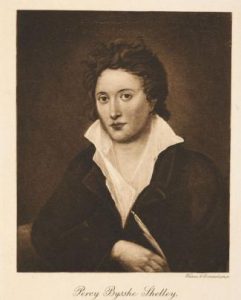
The Indian Serenade
I arise from dreams of thee
In the first sweet sleep of night,
When the winds are breathing low,
And the stars are shining bright:
I arise from dreams of thee,
And a spirit in my feet
Hath led me—who knows how?
To thy chamber window, Sweet!
The wandering airs they faint
On the dark, the silent stream—
The Champak odours fail
Like sweet thoughts in a dream;
The Nightingale’s complaint,
It dies upon her heart;—
As I must on thine,
Oh, belovèd as thou art!
Oh lift me from the grass!
I die! I faint! I fail!
Let thy love in kisses rain
On my lips and eyelids pale.
My cheek is cold and white, alas!
My heart beats loud and fast;—
Oh! press it to thine own again,
Where it will break at last.
Percy Bysshe Shelley
(1792 – 1822)
The Indian Serenade
• fleursdumal.nl magazine
More in: Archive S-T, Archive S-T, Percy Byssche Shelley
Mary Shelley verblijft op haar veertiende bij een familie in Schotland, waar een innige vriendschap ontstaat met Isabella Baxter.
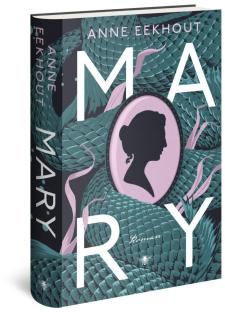 Samen dwalen ze in het gebied dat al eeuwen verhalen herbergt over monsters en geesten, en op een dag stuiten ze diep in het bos op een man die geen man is. De ledematen log en lelijk, een hoofd dat noch menselijk, noch dierlijk is.
Samen dwalen ze in het gebied dat al eeuwen verhalen herbergt over monsters en geesten, en op een dag stuiten ze diep in het bos op een man die geen man is. De ledematen log en lelijk, een hoofd dat noch menselijk, noch dierlijk is.
Vier jaar later brengt Mary met haar geliefde Percy Shelley een bezoek aan haar vrienden John Polidori en Lord Byron, bij het Meer van Genève. ’s Avonds bij het haardvuur vertellen ze elkaar verhalen. Een flintertje herinnering brengt haar terug naar haar tijd met Isabella in Schotland, en ook naar David Booth, een zeer intelligente, charismatische, maar tegelijk ook griezelige man, die een grote interesse in Mary en Isabella ontwikkelde. Dan dient ook het monster uit het bos zich weer aan, en vanuit die gedachte ontstaat haar verhaal over het monster van Frankenstein.
Mary is een ode aan de verbeelding, een verhaal over creëren, over de onlosmakelijke band tussen fantasie en werkelijkheid. En evenals Mary Shelley toont Anne Eekhout de kracht van een vrouw wanneer die iets ter wereld brengt wat niemand voor mogelijk had gehouden.
Anne Eekhout debuteerde in 2014 met de roman Dogma, die werd genomineerd voor de Bronzen Uil voor het beste debuut, op de longlist stond van de AKO Literatuurprijs en die wordt vertaald in het Duits. In 2016 verscheen Op een nacht (genomineerd voor de BNG Literatuurprijs) en in 2019 Nicolas en de verdwijning van de wereld, dat de prijs voor het Beste Boek voor Jongeren won. In november 2021 verschijnt de roman Mary waarin met verbluffende verbeeldingskracht de achttienjarige schepper van het meesterwerk Frankenstein tot leven wordt gewekt.
# new novel
Mary
Auteur: Anne Eekhout
Type: Gebonden
ISBN: 9789403153315
NUR: 301
Aantal pagina’s: 384
Uitgever: De Bezige Bij
Verschijningsdatum: 18-11-2021
Prijs: 24,99
• fleursdumal.nl magazine
More in: #Biography Archives, - Book News, - Bookstores, Archive E-F, Archive S-T, Byron, Byron, Lord, Keats, Keats, John, Mary Shelley, Percy Byssche Shelley, Shelley, Shelley, Mary, Shelley, Percy Byssche
The year 1818 saw the publication of one of the most influential science-fiction stories of all time.
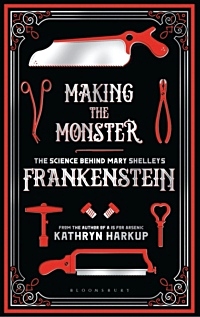 Frankenstein: Or, Modern Prometheus by Mary Shelley had a huge impact on gothic horror and science-fiction genres, and her creation has become part of our everyday culture, from cartoons to Hallowe’en costumes. Even the name ‘Frankenstein’ has become a by-word for evil scientists and dangerous experiments. How did a teenager with no formal education come up with the idea for an extraordinary novel such as Frankenstein?
Frankenstein: Or, Modern Prometheus by Mary Shelley had a huge impact on gothic horror and science-fiction genres, and her creation has become part of our everyday culture, from cartoons to Hallowe’en costumes. Even the name ‘Frankenstein’ has become a by-word for evil scientists and dangerous experiments. How did a teenager with no formal education come up with the idea for an extraordinary novel such as Frankenstein?
Clues are dotted throughout Georgian science and popular culture. The years before the book’s publication saw huge advances in our understanding of the natural sciences, in areas such as electricity and physiology, for example. Sensational science demonstrations caught the imagination of the general public, while the newspapers were full of lurid tales of murderers and resurrectionists.
Making the Monster explores the scientific background behind Mary Shelley’s book. Is there any science fact behind the science fiction? And how might a real-life Victor Frankenstein have gone about creating his monster? From tales of volcanic eruptions, artificial life and chemical revolutions, to experimental surgery, ‘monsters’ and electrical experiments on human cadavers, Kathryn Harkup examines the science and scientists that influenced Shelley, and inspired her most famous creation.
Kathryn Harkup is a chemist and author. Kathryn completed a PhD then a postdoc at the University of York before realising that talking, writing and demonstrating science appealed far more than spending hours slaving over a hot fume-hood. Kathryn went on to run outreach in engineering, computing, physics and maths at the University of Surrey, which involved writing talks on science and engineering topics that would appeal to bored teenagers, and she is now a science communicator delivering talks and workshops on the quirky side of science.
Making the Monster
The Science Behind Mary Shelley’s Frankenstein
By: Kathryn Harkup
Published: 08-02-2018
Format: Hardback
Edition: 1st
Extent: 304 pp
ISBN: 9781472933737
Imprint: Bloomsbury Sigma
Illustrations: 11 black and white illustrations
Dimensions: 216 x 135 mm
£16.99
new books
fleursdumal.nl magazine
More in: - Book News, Archive G-H, Archive S-T, Archive S-T, Art & Literature News, Mary Shelley, Natural history, Percy Byssche Shelley, Shelley, Mary, Shelley, Percy Byssche, Tales of Mystery & Imagination
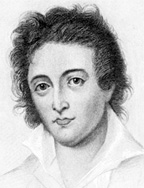
Percy Bysshe Shelley
(1792-1822)
Ozymandias of Egypt
I met a traveller from an antique land
Who said: Two vast and trunkless legs of stone
Stand in the desert… Near them, on the sand,
Half sunk, a shatter’d visage lies, whose frown,
And wrinkled lip, and sneer of cold command,
Tell that its sculptor well those passions read
Which yet survive, stamped on those lifeless things,
The hand that mocked them, and the heart that fed:
And on the pedestal these words appear:
“My name is Ozymandias, king of kings:
Look on my works, ye Mighty, and despair!”
Nothing beside remains. Round the decay
Of that colossal wreck, boundless and bare
The lone and level sands stretch far away.
Percy Bysshe Shelley
• fleursdumal.nl magazine
More in: Archive S-T, Archive S-T, Percy Byssche Shelley, Shelley, Percy Byssche
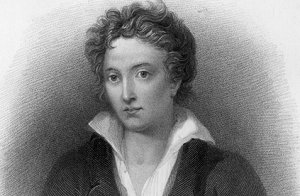
Percy Bysshe Shelley
(1792 – 1822)
Good-night
Good-night? ah! no; the hour is ill
Which severs those it should unite;
Let us remain together still,
Then it will be good night.
How can I call the lone night good,
Though thy sweet wishes wing its flight?
Be it not said, thought, understood —
Then it will be — good night.
To hearts which near each other move
From evening close to morning light,
The night is good; because, my love,
They never say good-night.
Percy Bysshe Shelley poetry
• fleursdumal.nl magazine
More in: Archive S-T, Percy Byssche Shelley, Shelley, Percy Byssche

Percy Bysshe Shelley
(1792-1822)
Good-night
Good-night? ah! no; the hour is ill
Which severs those it should unite;
Let us remain together still,
Then it will be good night.
How can I call the lone night good,
Though thy sweet wishes wing its flight?
Be it not said, thought, understood –
Then it will be — good night.
To hearts which near each other move
From evening close to morning light
The night is good, because, my love,
They never say good-night.
Slaap zacht
Slaap zacht? o nee, het uur valt zwaar
Dat binden moest wie scheiden wacht;
Verblijven wij steeds bij elkaar,
Dan wordt het pas: slaap zacht.
Hoe noem ik slapen “zacht”, alleen,
Al steunt ’t zijn vlucht als jij ’t lief zegt?
Maar komt voor ’t zeggen, ’t wensen, geen
Moment, volgt slaap zacht echt.
Voor harten altijd dicht tesaam,
Van ’s avonds laat tot ’s morgens vroeg,
Is nachttijd, liefste, aangenaam
En slaap al zacht genoeg.
Vertaling Cornelis W. Schoneveld 2012
Percy Bysshe Shelley poetry
kempis.nl poetry magazine
More in: Percy Byssche Shelley, Shelley, Shelley, Percy Byssche
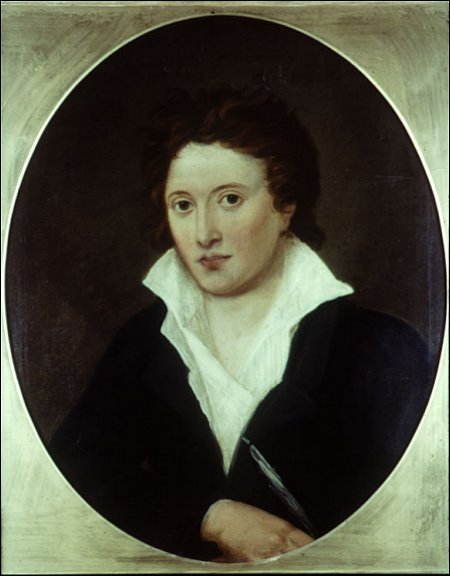
Percy Bysshe Shelley
(1792 – 1822)
Good-night
Good-night? ah! no; the hour is ill
Which severs those it should unite;
Let us remain together still,
Then it will be good night.
How can I call the lone night good,
Though thy sweet wishes wing its flight?
Be it not said, thought, understood —
Then it will be — good night.
To hearts which near each other move
From evening close to morning light,
The night is good; because, my love,
They never say good-night.
Percy Bysshe Shelley poetry
kempis.nl poetry magazine
More in: Archive S-T, Percy Byssche Shelley, Shelley, Percy Byssche
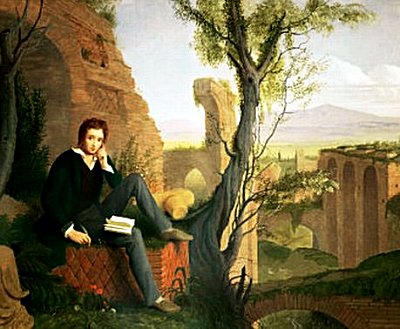
Percy Byssche Shelley
(1792-1822)
To Night
Swiftly walk o’er the western wave,
Spirit of Night!
Out of the misty eastern cave,
Where, all the long and lone daylight,
Thou wovest dreams of joy and fear,
Which make thee terrible and dear, –
Swift be thy flight!
Wrap thy form in a mantle grey,
Star-inwrought!
Blind with thine hair the eyes of Day;
Kiss her until she be wearied out –
Then wander o’er city, and sea, and land,
Touching all with thine opiate wand –
Come, long-sought!
When I arose and saw the dawn,
I sighed for thee;
When light rode high, and the dew was gone,
And noon lay heavy on flower and tree,
And the weary Day turned to his rest,
Lingering like an unloved guest,
I sighed for thee.
Thy brother Death came, and cried,
Wouldst thou me?
Thy sweet child Sleep, the filmy-eyed,
Murmured like a noontide bee,
Shall I nestle near thy side?
Wouldst thou me? – And I replied,
No, not thee!
Death will come when thou art dead,
Soon, too soon –
Sleep will come when thou art fled;
Of neither would I ask the boon
I ask of thee belovèd Night –
Swift be thine approaching flight,
Come soon, soon!
1821
Percy Byssche Shelley
Aan de nacht
Jaag snel over de westgolf voort,
Geest van de Nacht!
Uit de mistgrot van ‘t oosters oord,
Waar, ‘t daglicht lang, jij eenzaam wacht,
En bange en blije dromen weeft,
Wat angst, en vriendschap, voor je geeft, –
Snel zij je jacht!
Neem ‘n mantel, grijs, met sterbeslag,
Sla hem om!
Blinddoek met j’ haardos eerst de Dag;
Kus haar dan moe, weerom en weerom –
Ga daarna stad, en land, en zeeën af,
‘t Al rakend met je opiumstaf –
Gezochte, kom!
Toen de ochtend gloorde voor mijn oog,
Gold jou mijn zucht;
Toen dauw weg was, en het daglicht hoog,
Toen ‘t groen leed door de middaglucht,
En toen moe de Dag zocht naar zijn rust,
Dralend als ‘n gast, lang weggekust,
Gold jou mijn zucht.
Je broer de Dood kwam, en vroeg,
“Zocht je mij?”
Je zoet kind Slaap, die ‘n oogfloers droeg,
Gonsde als een middagbij:
“Wou jij dat ik naast je sliep?
Zocht je mij?” – Waarop ik riep,
“Weg hier, jij!”
Dood komt na jouw laatste zucht,
Gauw, te gauw –
Slaap komt als jij bent gevlucht;
De gunst die ik nu vraag van jou
Vraag ik hun niet, geliefde Nacht –
Eindig hier gezwind je jacht,
Kom gauw, gauw!
Vertaling Cornelis W. Schoneveld
Uit: Bestorm mijn hart, de beste Engelse gedichten uit de 16e-19e eeuw gekozen en vertaald door Cornelis W. Schoneveld, tweetalige editie. Rainbow Essentials no. 55, Uitgeverij Maarten Muntinga, Amsterdam, 2008, 296 pp, € 9,95 ISBN: 9789041740588
Kempis.nl poetry magazine
More in: Archive S-T, Percy Byssche Shelley, Shelley, Shelley, Percy Byssche

Percy Bysshe Shelley
(August 4, 1792 Horsham, England – July 8, 1822 Livorno, Italy)
Nine Poems
Death
1
They die–the dead return not–Misery
Sits near an open grave and calls them over,
A Youth with hoary hair and haggard eye–
They are the names of kindred, friend and lover,
Which he so feebly calls–they all are gone–
Fond wretch, all dead! those vacant names alone,
This most familiar scene, my pain–
These tombs–alone remain.
2
Misery, my sweetest friend–oh, weep no more!
Thou wilt not be consoled–I wonder not!
For I have seen thee from thy dwelling’s door
Watch the calm sunset with them, and this spot
Was even as bright and calm, but transitory,
And now thy hopes are gone, thy hair is hoary;
This most familiar scene, my pain–
These tombs–alone remain.

Satan broken loose
(fragment)
A golden-winged Angel stood
Before the Eternal Judgement-seat:
His looks were wild, and Devils’ blood
Stained his dainty hands and feet.
The Father and the Son
Knew that strife was now begun.
They knew that Satan had broken his chain,
And with millions of daemons in his train,
Was ranging over the world again.
Before the Angel had told his tale,
A sweet and a creeping sound
Like the rushing of wings was heard around;
And suddenly the lamps grew pale–
The lamps, before the Archangels seven,
That burn continually in Heaven.

Lines to a critic
1
Honey from silkworms who can gather,
Or silk from the yellow bee?
The grass may grow in winter weather
As soon as hate in me.
2
Hate men who cant, and men who pray,
And men who rail like thee;
An equal passion to repay
They are not coy like me.
3
Or seek some slave of power and gold
To be thy dear heart’s mate;
Thy love will move that bigot cold
Sooner than me, thy hate.
4
A passion like the one I prove
Cannot divided be;
I hate thy want of truth and love–
How should I then hate thee?

To…?
1
I fear thy kisses, gentle maiden,
Thou needest not fear mine;
My spirit is too deeply laden
Ever to burthen thine.
2
I fear thy mien, thy tones, thy motion,
Thou needest not fear mine;
Innocent is the heart’s devotion
With which I worship thine.
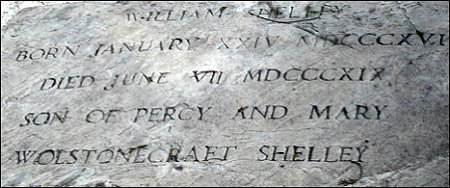
Song of Proserpine while gathering flowers
on the Plain of Enna
1
Sacred Goddess, Mother Earth,
Thou from whose immortal bosom
Gods, and men, and beasts have birth,
Leaf and blade, and bud and blossom,
Breathe thine influence most divine
On thine own child, Proserpine.
2
If with mists of evening dew
Thou dost nourish these young flowers
Till they grow, in scent and hue,
Fairest children of the Hours,
Breathe thine influence most divine
On thine own child, Proserpine.
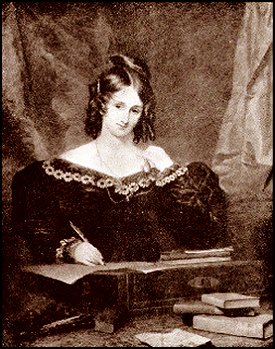
Autumn: A Dirge
1
The warm sun is failing, the bleak wind is wailing,
The bare boughs are sighing, the pale flowers are dying,
And the Year
On the earth her death-bed, in a shroud of leaves dead,
Is lying.
Come, Months, come away,
From November to May,
In your saddest array;
Follow the bier
Of the dead cold Year,
And like dim shadows watch by her sepulchre.
2
The chill rain is falling, the nipped worm is crawling,
The rivers are swelling, the thunder is knelling
For the Year;
The blithe swallows are flown, and the lizards each gone
To his dwelling;
Come, Months, come away;
Put on white, black, and gray;
Let your light sisters play–
Ye, follow the bier
Of the dead cold Year,
And make her grave green with tear on tear.

Death
1
Death is here and death is there,
Death is busy everywhere,
All around, within, beneath,
Above is death–and we are death.
2
Death has set his mark and seal
On all we are and all we feel,
On all we know and all we fear,
3
First our pleasures die–and then
Our hopes, and then our fears–and when
These are dead, the debt is due,
Dust claims dust–and we die too.
4
All things that we love and cherish,
Like ourselves must fade and perish;
Such is our rude mortal lot–
Love itself would, did they not.
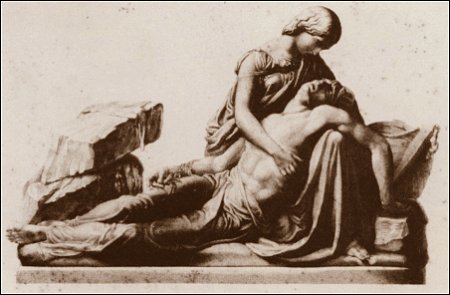
To the moon
1
Art thou pale for weariness
Of climbing heaven and gazing on the earth,
Wandering companionless
Among the stars that have a different birth,–
And ever changing, like a joyless eye
That finds no object worth its constancy?
2
Thou chosen sister of the Spirit,
That grazes on thee till in thee it pities…
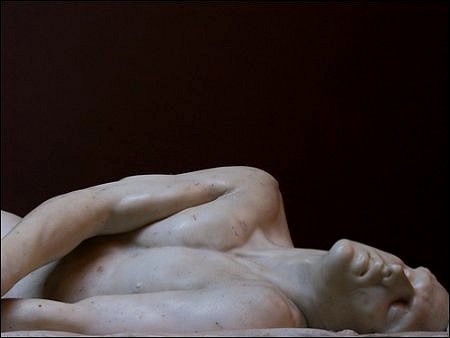
Sonnet
Ye hasten to the grave! What seek ye there,
Ye restless thoughts and busy purposes
Of the idle brain, which the world’s livery wear?
O thou quick heart, which pantest to possess
All that pale Expectation feigneth fair!
Thou vainly curious mind which wouldest guess
Whence thou didst come, and whither thou must go,
And all that never yet was known would know–
Oh, whither hasten ye, that thus ye press,
With such swift feet life’s green and pleasant path,
Seeking, alike from happiness and woe,
A refuge in the cavern of gray death?
O heart, and mind, and thoughts! what thing do you
Hope to inherit in the grave below?
Percy Bysshe Shelley: Nine Poems
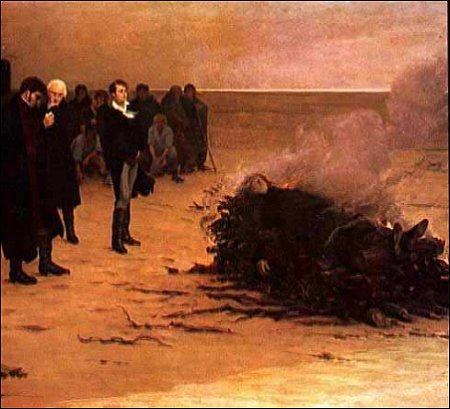
• fleursdumal.nl magazine for art & literature
More in: Archive S-T, Archive S-T, Percy Byssche Shelley, Shelley, Percy Byssche
Thank you for reading Fleurs du Mal - magazine for art & literature